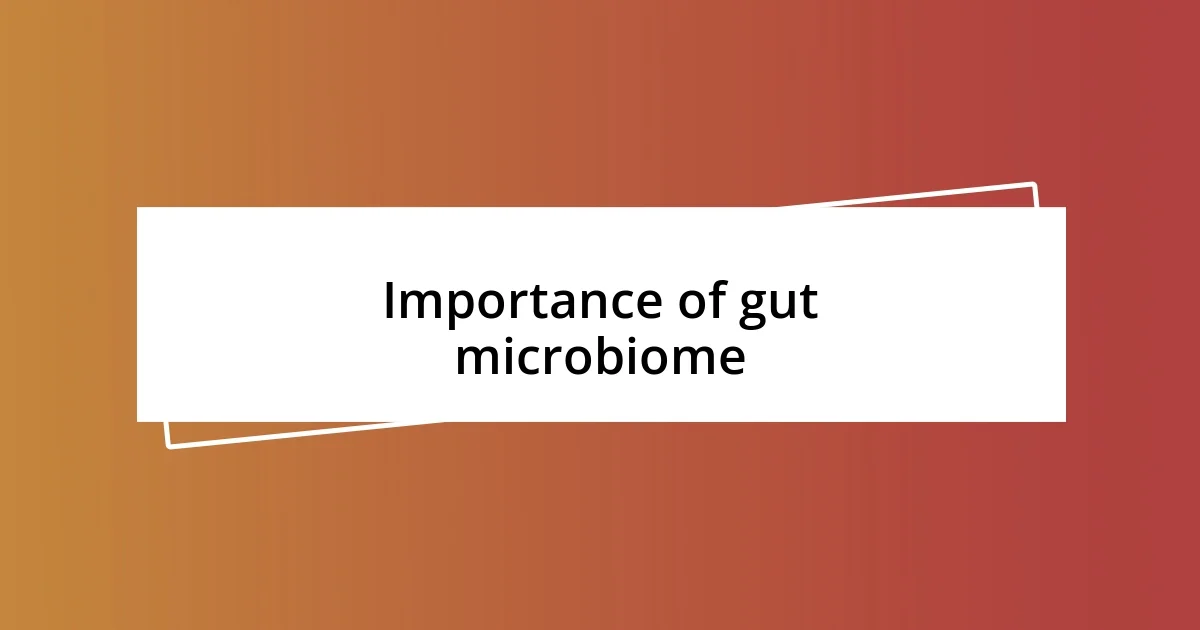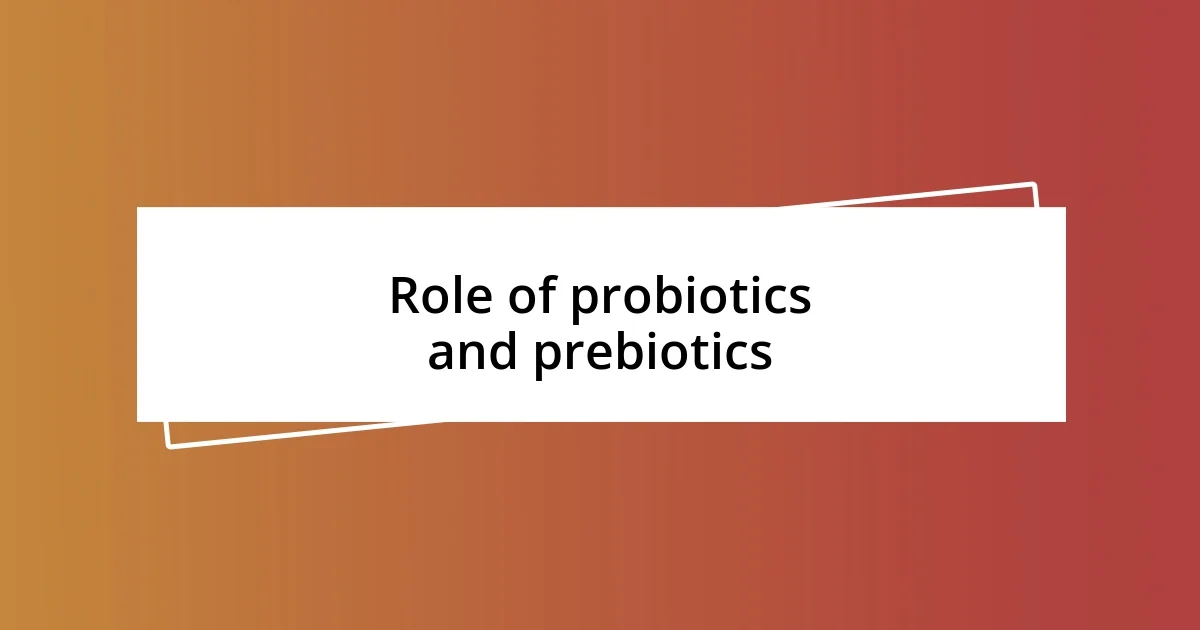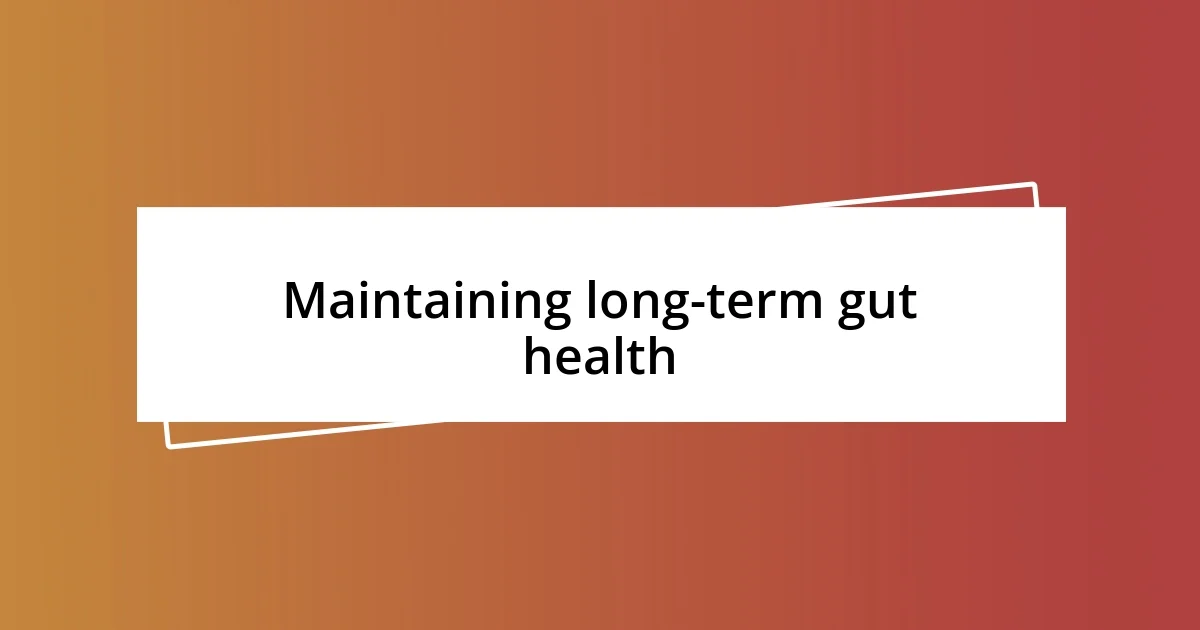Key takeaways:
- Gut health significantly affects overall well-being, including energy levels, mood, and digestive health, highlighting the importance of a balanced microbiome.
- Incorporating nutrient-rich foods such as fermented items, fiber-rich options, and prebiotics can improve gut health and enhance nutrient absorption.
- Practicing hydration, limiting processed foods, and managing stress are essential strategies for maintaining long-term gut health and overall vitality.

Understanding gut health basics
Gut health is often overlooked, yet it plays a vital role in our overall well-being. I remember a time when I felt constantly fatigued, and after diving into my digestive health, I realized my gut wasn’t functioning optimally. Have you ever considered how your energy levels might be tied to what’s happening in your gut?
The gut, often referred to as the “second brain,” houses trillions of bacteria that influence everything from digestion to immune function. I was amazed to learn that a healthy gut can affect my mood and even mental clarity. Isn’t it fascinating how something so seemingly small can have such a massive impact on our daily lives?
Furthermore, maintaining a balance of good bacteria is essential. When I focused on incorporating more fibers and fermented foods into my diet, I immediately noticed an improvement in my digestion and a general sense of well-being. Have you tried adjusting your diet for gut health? The results can be quite eye-opening.

Importance of gut microbiome
The gut microbiome is crucial for maintaining a balanced immune system, an insight I discovered while researching the connection between gut health and immunity. I used to catch colds frequently, but once I began incorporating probiotics into my diet, I noted a significant drop in my illness frequency. Have you felt the difference in your body’s defenses after nurturing your gut?
What truly astonished me was how the gut microbiome can influence mental health. During a particularly stressful period in my life, I started experiencing brain fog and mood swings. After learning that gut health could be tied to feelings of anxiety and depression, I focused on incorporating foods rich in prebiotics. The lift in my mood was not just a coincidence; the gut truly communicates with the brain. Have you ever intuitively felt that your gut was telling you something about your emotional state?
It’s fascinating to realize that the gut microbiome aids in digesting nutrients, connecting what we eat directly to our vitality. When I switched to a diet with more plant-based options, my energy levels soared, making daily activities feel less like a chore. Each meal became a source of nourishment rather than just sustenance. Do you pay attention to the way certain foods energize or drain you? This interplay between diet and gut health can be a game-changer.
| Importance of Gut Microbiome | Description |
|---|---|
| Immune System Support | A healthy gut microbiome strengthens the immune system, potentially reducing the frequency of illnesses. |
| Mental Health Connection | The gut microbiome influences mental well-being, affecting mood and cognitive functions. |
| Nutrient Absorption | Optimally functioning gut bacteria aid in digesting food and absorbing essential nutrients. |

Foods that support gut health
Understanding which foods nurture our gut can be quite a revelation. I’ve recently started incorporating foods like yogurt and kefir into my snacks, and it’s been delightful. The tangy taste of these fermented options is not only enjoyable but also packed with probiotics that help restore that essential balance in my gut flora. It’s amazing how a simple change can make such a significant difference in overall digestion and energy levels.
Here’s a list of foods that I’ve found particularly beneficial for supporting gut health:
- Fermented Foods: Yogurt, kefir, sauerkraut, and kimchi are rich in probiotics.
- Fiber-Rich Foods: Whole grains, fruits, and vegetables promote a healthy digestive system.
- Prebiotic Foods: Foods like garlic, onions, and bananas feed the good bacteria in our guts.
- Bone Broth: This nutrient-rich option can help heal the gut lining and support digestive health.
- Omega-3 Fatty Acids: Found in fish, flaxseeds, and walnuts, they have anti-inflammatory benefits.
My journey led me to explore the wonders of plant-based foods. I started adding a variety of colorful vegetables to my meals, and I’ve noticed a tangible improvement in my digestion and energy levels. It’s energizing to think that each vibrant carrot or leafy green contributes to my gut health, creating a delicious symphony of nutrients. Eating mindfully has become an enlightening experience, reminding me that we truly are what we eat!

Common gut health issues
Gut health issues can manifest in a variety of ways, and they’re more common than I initially thought. For instance, I once struggled with bloating after meals, which left me feeling uncomfortable and frustrated. After researching, I learned that many people face similar challenges. Conditions like irritable bowel syndrome (IBS) often lead to symptoms such as gas, diarrhea, or constipation, making me wonder how many others experience this disruptiveness daily. Have you ever felt like your digestive system was out of sync?
Another prevalent concern is food intolerances, which can sneak up on us without warning. Like many, I discovered my sensitivity to lactose later in life. The discomfort and digestive distress made me introspective about the importance of listening to my body. I realized that some foods, while beloved, just don’t sit well with me. Understanding food intolerances opens a path to better gut health, wouldn’t you agree?
Lastly, chronic inflammation is a silent player that dramatically affects gut health. There was a time when I noticed persistent fatigue and discomfort but couldn’t pinpoint why. Delving deeper, I found that inflammation could stem from various sources, including poor diet or stress. Finding ways to reduce inflammation in my diet, such as incorporating more anti-inflammatory foods, has made a significant difference in how I feel daily. Have you noticed how certain foods can either energize you or leave you feeling drained?

Tips for improving gut health
In my journey to improve gut health, one of the most transformative changes I made was to stay hydrated. I started aiming for at least eight glasses of water a day, which really helped with digestion and overall well-being. Sometimes, I underestimated the power of water—such a simple thing can have a profound impact, don’t you think?
Another tip I’ve embraced is to limit processed foods and added sugars. Initially, I thought giving up my favorite snacks would be tough, but I discovered healthier alternatives that are just as satisfying. For example, trading chips for a handful of nuts or fresh veggies with hummus made snacking more nutritious and fulfilling. The shift not only improved my gut health, but it also connected me to a variety of new flavors that I never knew I’d enjoy!
Lastly, I cannot stress enough the importance of stress management. There was a period when I was overwhelmed, and I noticed my digestion took a hit during those times. Practicing mindfulness and incorporating activities like yoga and meditation into my routine has helped me find balance. Have you ever experienced how stress can ripple through your body? Finding ways to relax has truly nurtured my gut, showing me just how interconnected our body and mind are.

Role of probiotics and prebiotics
Probiotics and prebiotics play a vital role in maintaining gut health, and I’ve seen firsthand how they can transform my digestive experience. Probiotics are live beneficial bacteria that essentially help balance the gut flora. When I started incorporating yogurt with active cultures into my diet, I noticed a significant reduction in my bloating issues. It was almost like my gut said, “Thank you!” Have you ever felt a noticeable difference after changing your diet?
On the flip side, prebiotics are the food for these good bacteria. They come from certain fibers found in fruits and vegetables, like bananas and asparagus. Once I realized that these foods could help nourish my gut’s natural defenses, I added them to my meals more intentionally. The energy boost and improved mood I experienced were a pleasant surprise—who knew eating my greens could yield such a big payoff?
Understanding how these components work together has completely changed my approach to gut health. I often wonder how many others are unaware of this simple yet effective duo. For instance, when was the last time you checked what’s in your refrigerator? A little planning around these crucial gut helpers can lead to lasting improvements in overall well-being, something I continually strive for.

Maintaining long-term gut health
Maintaining long-term gut health is a commitment that I’ve found truly rewarding. One of my biggest revelations was learning to listen to my body’s signals. For instance, if I ever overindulged in rich foods, I’d notice discomfort the next day. It taught me to be more mindful of my choices—not just in the moment, but how they impact my future well-being. Have you ever experienced a food hangover that made you reconsider your eating habits?
Another key aspect I’ve embraced is consistency in my meal patterns. By eating at regular intervals, I noticed my digestive system began to thrive. There was a time when my chaotic schedule led me to skip meals, and I could feel the difference—my energy dipped, and my gut wasn’t happy. Now, I prioritize balanced meals throughout the day, aiming for variety that includes fiber-rich foods, proteins, and healthy fats. It’s amazing how a little routine can bring a sense of stability to my overall health, don’t you think?
Lastly, I advocate for a personal approach to probiotics tailored to my needs. After experimenting with different strains, I discovered that a specific brand made a difference in how I felt after meals. I remember being skeptical at first, but as I continued incorporating it daily, my digestion improved significantly, almost like it was the final piece of my gut health puzzle. Finding what works for me is an ongoing journey, and I encourage you to explore what fits your lifestyle best! What unique mixture could elevate your gut health journey?














